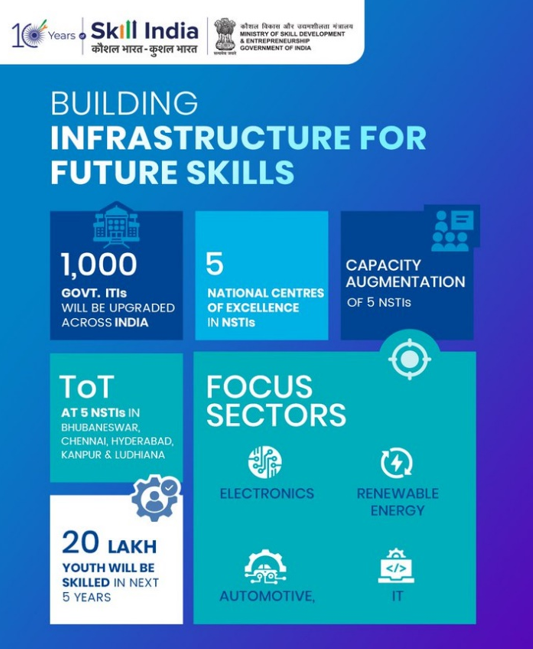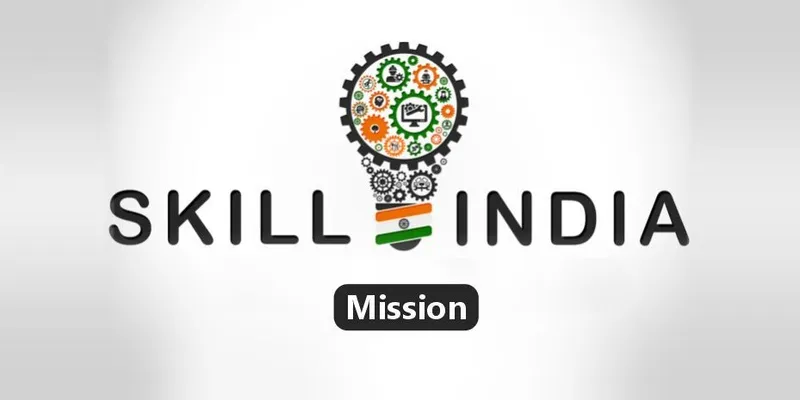Syllabus:
GS3: Inclusive growth and issues arising from it.
Context:
Recently, the Skill India Mission has completed 10 Years in July 2025.
More on the News

- The Ministry of Skill Development and Entrepreneurship has empowered over 6 crore Indians through its various schemes since 2014.
- Over 1.6 crore youth had been trained nationwide since 2015 under Pradhan Mantri Kaushal Vikas Yojana.
- As of July 11, 2025, over 25 lakh candidates have been trained under Pradhan Mantri Kaushal Vikas Yojana 4.0.
Skill India Mission
- The Skill India Mission (SIM) delivers skill, re-skill and up-skill training through an extensive network of skill development centres/institutes under various schemes.
- In February 2025, the restructured ‘Skill India Programme’ was approved for 2022-23 to 2025-26, merging Pradhan Mantri Kaushal Vikas Yojana 4.0 (PMKVY 4.0), the Pradhan Mantri National Apprenticeship Promotion Scheme (PM-NAPS), and the Jan Shikshan Sansthan (JSS) Scheme into a single Central Sector Scheme.
Pradhan Mantri Kaushal Vikas Yojana (PMKVY)
- The PMKVY scheme was launched on July 15, 2015, to encourage and promote skill development in the country by providing free short-duration skill training and incentivizing this by providing monetary rewards to youth for skill certification.
- The scheme aims to enhance industry growth and youth employability. Following the success of the PMKVY 2015–16 pilot, PMKVY 2016–20 was expanded across sectors and regions, aligning with key government missions like Make in India, Digital India, and Swachh Bharat.
- Placements were tracked under Short Term Training (STT) component of PMKVY in the first three versions of the scheme which is PMKVY 1.0, PMKVY 2.0 and PMKVY 3.0 implemented from FY 2015-16 to FY 2021-22.
- The reported placement rate in STT certified candidates till PMKVY 3.0 was 42.8%.
- Under PMKVY 4.0, the focus is to empower trained candidates to choose their varied career path and they are suitably oriented for the same.
- To enable opportunities for employment, Skill India Digital Hub (SIDH) platform has been launched to integrate skilling, education, employment, and entrepreneurship ecosystems.
National Apprenticeship Promotion Scheme (NAPS)
- NAPS promotes apprenticeship by offering financial support for apprentice stipends. Training includes both basic and on-the-job/practical training in industries.
- Under PM-NAPS, over 43.47 lakh apprentices have been engaged across 36 States and Union Territories as of 19 May 2025, with participation from more than 51,000 establishments.
- NAPS helps address the skills gap by ensuring that apprentices are trained in areas that meet the current needs of the industry.
Jan Shikshan Sansthan (JSS)
- It offers vocational skills to non-literates, neo-literates, and school dropouts (up to 12th standard), aged 15–45. Focuses on women, SC, ST, OBC and minorities in rural and low-income urban areas.
- More than 26 lakh people have been trained from FY 2018 19 to FY 2023-24 under the scheme.
Other Schemes Empowering Skill Development
- PM Vishwakarma Yojana: The Central Sector Scheme, launched on 17th September, 2023 set to run for 5 years, aims to provide end-to-end support to artisans and craftspeople of 18 trades who work with their hands and tools.
The Scheme components include recognition through PM Vishwakarma Certificate and ID Card, Skill Upgradation, Toolkit Incentive, Credit Support, Incentive for Digital Transactions and Marketing Support. - Deen Dayal Upadhyaya Grameen Kaushalya Yojana (DDU-GKY): Launched on 25th September 2014, DDU-GKY is a part of the National Rural Livelihood Mission (NRLM), tasked with the dual objectives of adding diversity to the incomes of rural poor families and cater to the career aspirations of rural youth.
Under the scheme, 65% of the candidates have been placed in gainful employment after completing their training. - Rural Self Employment and Training Institutes (RSETIs): Launched in January 2009, the scheme envisages framework for imparting good quality residential free training and post training follow up with credit linkage for sustained motivation among the trainees for promoting entrepreneurship among the rural youth.
As RSETIs are Bank lead institutions they are prefixed with the name of the respective sponsor banks to give distinct identity.


